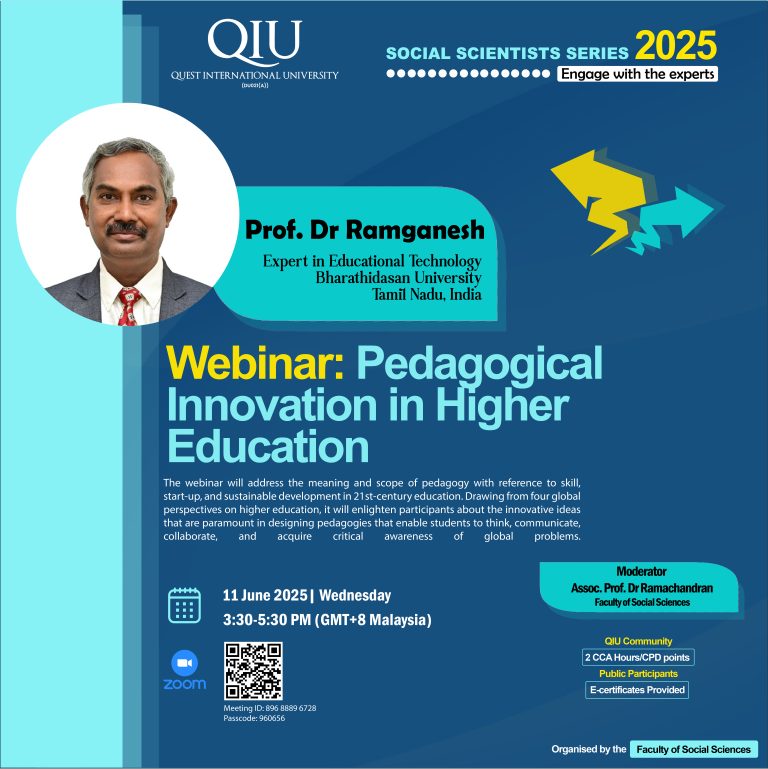In a compelling effort to spotlight the evolving landscape of education, our Faculty of Social Sciences’ School of Postgraduate Studies recently hosted an enlightening webinar titled “Pedagogical Innovations in Higher Education”. The virtual session brought together participants, comprising academics, researchers, and university students from diverse disciplines, reflecting the growing interest in reshaping teaching and learning for the 21st century.
The session was officially inaugurated by QIU Vice-Chancellor Professor Zita Mohd Fahmi, who emphasized the university’s commitment to fostering academic excellence through innovative educational practices.
The keynote address was delivered by Professor Dr. Ramganesh, a distinguished expert in Educational Technology from Bharathidasan University, Tamil Nadu, India. His presentation offered a thought-provoking exploration of pedagogy’s evolving role in the 21st century, highlighting the interconnectedness of skill development, entrepreneurship, and sustainable education.
Drawing from four global frameworks in higher education, the webinar highlighted the importance of innovative teaching strategies that foster critical thinking, effective communication, meaningful collaboration, and global engagement. The discussions reinforced the need for flexible, forward-looking educational models that equip students with the competencies required to succeed in an increasingly interconnected world.
The demand for quality education has never been more critical in the 21st century. As global challenges and technological advancements reshape industries, education systems must evolve to equip students with essential skills.
Pedagogical innovations—such as flipped classrooms, blended learning, competency-based education, and inquiry-driven learning—enhance engagement and prepare learners for the complexities of Industry 4.0.
Higher education institutions play a transformative role beyond academic instruction. They serve as centers for social innovation, economic progress, and lifelong learning. To ensure graduates are workforce-ready, universities must prioritise qualification-based learning, interdisciplinary integration, and holistic education. Emerging university models, including skill-focused, networked, and personalised learning institutions, reflect this shift.
Fusion education integrates disciplines, technologies, and pedagogies, fostering critical thinking, creativity, and digital fluency. Teachers must design learning environments that cater to diverse student needs, incorporating frameworks that develop intellectual and emotional intelligence.
As higher education transitions to flexible, learner-centred models, embracing pedagogical innovation is key to fostering adaptability and problem-solving skills. Institutional support, faculty development, and inclusivity are essential in implementing these reforms effectively, ensuring students acquire the competencies needed to thrive in an evolving global landscape.
The discussions pointed to a clear imperative: universities must create inclusive, adaptive learning environments that support both intellectual and emotional growth. Institutional support, faculty development, and a commitment to inclusivity are vital to the successful implementation of pedagogical reforms.
As the higher education sector continues its transformation, initiatives like QIU’s webinar serve as valuable platforms for collaboration, reflection, and progress. By embracing pedagogical innovation, universities can empower learners to navigate and contribute meaningfully to an increasingly interconnected and fast-changing global society.




